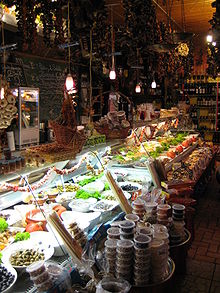Delicatessen
![]()
The articles delicatessen and delicatessen overlap thematically. Information that you are looking for here may also be found in the other article.
You are welcome to participate in the relevant redundancy discussion or to help directly to merge the
articles or to better distinguish them from each other (→ Instructions).
![]()
The title of this article is ambiguous. For the cultural center of the same name, see Feinkost (cultural center).
Delicatessen (in Switzerland, the somewhat broader term comestibles, French for edibles, is also sometimes used) refers to special foods or foods selected with special care that are not part of everyday requirements, such as caviar, frogs' legs, snails, oysters, champagne or exotic vegetables and fruits. Delicatessen products are prepared foodstuffs of special quality such as fine salads (Waldorf salad, poultry salad), pâtés, seasoning sauces and mayonnaises, selected types of cheese and meat products as well as some ready-made dishes such as ragout fin or fricassee. Also included are well-stocked fish and seafood departments, which often exceed the standard offerings of a fishmonger.
The term "delicatessen" - like the similar "delicacy" - cannot be defined more precisely and is not regulated by law, so it can be used for advertising purposes as desired. Binding guidelines exist only for "delicatessen salads" in the German Food Book.
Delicatessen products are offered in all branches of food retailing, especially in the so-called delicatessen and delicatessen trade. In general food retailing, such as in supermarkets, delicatessen items are often presented separately. Another form of supply is the special mail order business. For the demanding gastronomy, there are delicatessen wholesalers who buy and sell particularly high-quality food and products.

Counter in a delicatessen
Search within the encyclopedia